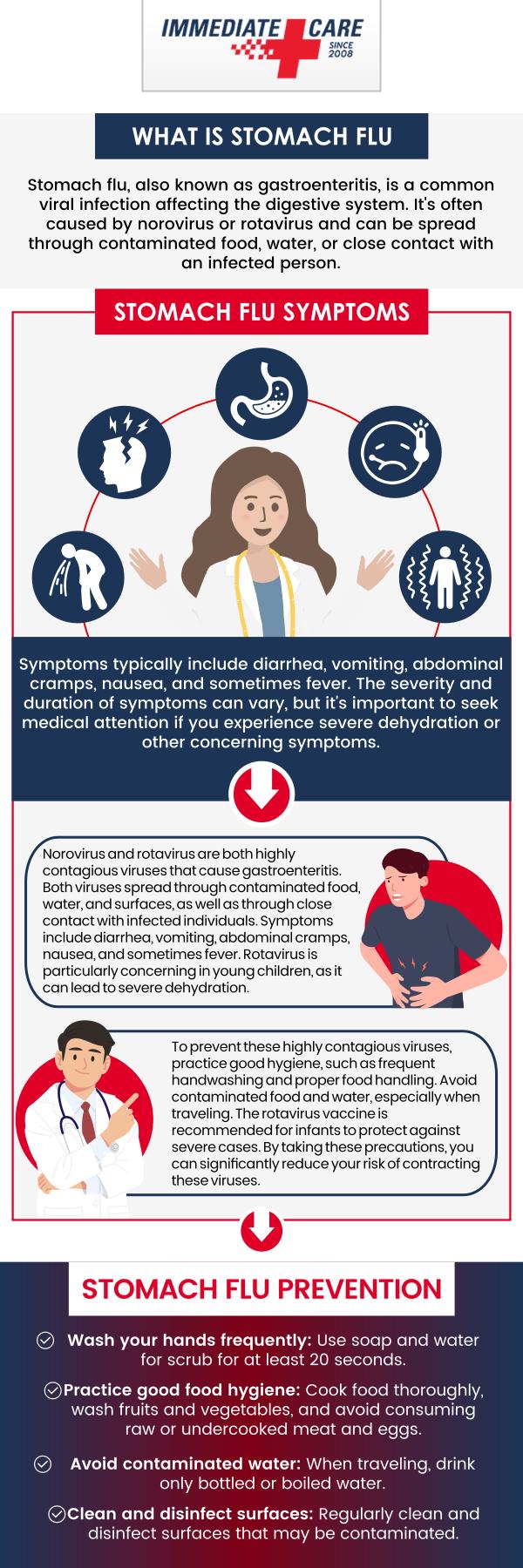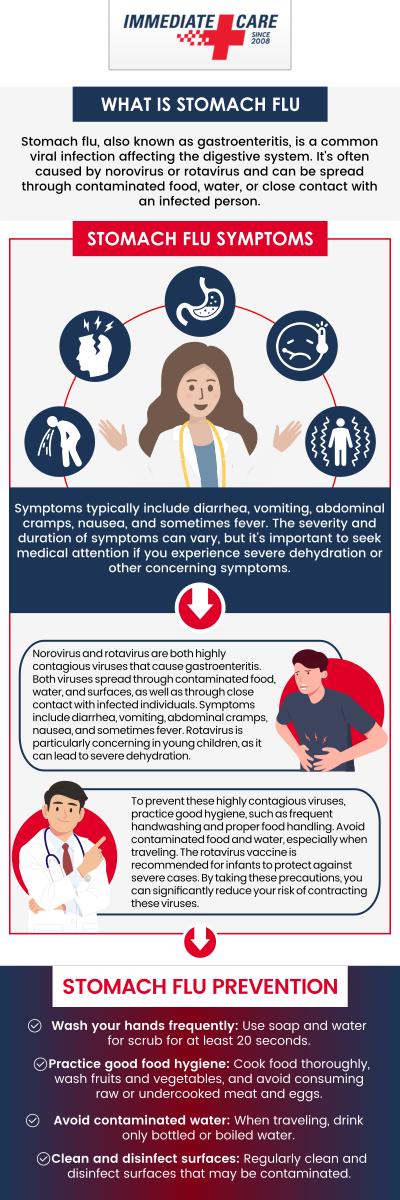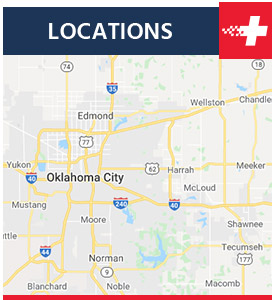24-Hour Stomach Bug: Symptoms, Causes, and Treatment
Stomach flu is a viral infection that spreads from person to person. Symptoms of a 24-hour stomach bug typically include gastrointestinal distress like vomiting, diarrhea, abdominal pain, and cramps, along with fever and headache. These symptoms tend to develop one to three days after exposure to the virus and can vary in intensity based on the specific virus and the individual’s immune response. Dr. Kevin Penwell (D.O.) and his team of medical professionals offer 24-hour stomach bug healthcare at Immediate Care of Oklahoma. Contact us for more information or book an appointment online. We have convenient locations to serve you in Edmond OK, Norman (24th) OK, Norman (HealthPlex) OK, Tecumseh OK, West Moore OK, I-240 and Sooner RD OK, Yukon OK, and Choctaw, OK.




Table of Contents:
What does a 24-hour stomach bug feel like?
What causes a 24-hour stomach bug?
What are the symptoms of a 24-hour stomach bug?
How long is a 24-hour stomach bug contagious?
What is the quickest way to get rid of a stomach bug?
A 24-hour stomach bug, often referred to as the stomach flu, makes individuals feel unwell with a wide range of symptoms, mostly related to the gastrointestinal tract.
This condition leads to inflammation of the stomach and intestines, resulting in abdominal pain, cramps, nausea, vomiting, fever, and headaches. Symptoms usually appear suddenly and tend to subside gradually over time.
The way a 24-hour stomach bug feels can be similar to other health issues like food poisoning or bacterial infections, making it difficult to identify without professional diagnosis. The initial impact of a 24-hour stomach bug is quite severe, disrupting day-to-day life significantly. Since the symptoms present primarily at the start, any relief provided through treatment can greatly help in managing the discomfort.
The 24-hour stomach bug is usually caused by contagious infections like the norovirus, distinct from the influenza virus responsible for the flu. Norovirus is particularly common among adults, while other viruses like rotavirus are more prevalent in young children and infants.
These viruses are highly contagious, spreading through direct contact with an infected person or consumption of contaminated food or water. The ability of these viruses to easily pass makes it important to identify the symptoms early to manage the condition effectively.
Given the variety of viruses that can cause a stomach bug, symptoms can mimic those of other illnesses, making it difficult for individuals to identify a 24-hour stomach bug on their own.
This is why it’s crucial for those experiencing symptoms to seek care at places like Immediate Care of Oklahoma. There, healthcare professionals can conduct thorough examinations and, if necessary, stool tests to determine whether a virus, bacteria, or parasite is responsible for the symptoms.
Symptoms of a 24-hour stomach bug typically include gastrointestinal distress like vomiting, diarrhea, abdominal pain, and cramps, along with fever and headache. These symptoms tend to develop one to three days after exposure to the virus and can vary in intensity based on the specific virus and the individual’s immune response.
The symptoms, while predominantly gastrointestinal, can also lead to systemic effects such as fatigue, body aches, and swollen lymph nodes due to the immune system’s reaction to the infection.
Immediate Care of Oklahoma can provide guidance on symptom management and help differentiate the stomach bug from more serious conditions that may present similarly.
The contagious period of a 24-hour stomach bug can vary widely, sometimes beginning before symptoms appear and lasting up to two weeks after recovery. This variability makes it important for individuals to follow healthcare providers’ advice regarding self-isolation and home care to prevent spreading the virus to others.
In cases involving children, it’s advisable to keep them out of school for at least 48 hours after symptoms have subsided to minimize the risk of contagion. The differing contagion periods means it’s important for individuals to consult with urgent care providers to identify the exact nature of their stomach symptoms.
Providers at Immediate Care of Oklahoma will advise patients on expected contagion periods based on the nature of their condition and advise them of necessary isolative measures.
Most treatments for a 24-hour stomach bug involve home care aimed at symptom management and preventing dehydration. Avoiding solid foods for several hours and then gradually reintroducing bland, easy-to-digest foods can help minimize symptoms.
Staying hydrated is important in all aspects of health and wellness and is particularly important during this period. In some cases, anti-diarrheal medications may be beneficial. Rest is also a key component of recovery, as the body needs energy to fight off the virus and heal. For quick relief and recovery, it’s important to follow these self-care steps and consult with a healthcare provider if symptoms persist or worsen.
Immediate Care of Oklahoma can offer advice on managing symptoms at home and provide treatment options to alleviate discomfort and prevent dehydration, which is a major concern with stomach bugs.
By taking appropriate care and following medical advice, individuals can recover more comfortably and reduce the risk of spreading the virus.
24-hour stomach bug healthcare is available at Immediate Care of Oklahoma. For more information, contact us or schedule an appointment online. We have convenient locations to serve in Oklahoma City, OK. We serve patients from West Moore OK, Norman (HealthPlex) OK, Norman (24th) OK, Edmond OK, Yukon OK, I-240 & Sooner RD OK, Tecumseh OK, Choctaw OK, and surrounding areas.


Additional Services You May Need
▸ Urgent Care Services
▸ Illness + Injuries
▸ On Site Lab + X-Ray
▸ Helpful Health
▸ Motor Vehicle Accidents
▸ Drug Testing
▸ MRO
▸ UTI Treatment
▸ Employment Physicals
▸ Workers Comp
▸ Strep Throat Treatment
▸ Pregnancy Testing
▸ Blood Pressure Testing
▸ Urinalysis
▸ Mononucleosis Treatment
▸ Suture Removal
▸ Respiratory Syncytial Virus
▸ OccMed








